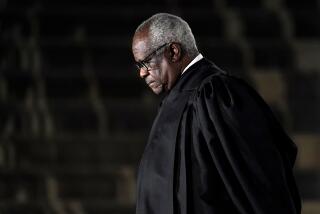Clarence Thomas and Natural Law
Riley’s column bemoans the loss of the use of “natural law” as a legitimate basis for judicial decision-making. Readers might be interested in the language of two famous Supreme Court cases decided on the basis of the laws of nature. In Plessy vs. Ferguson, the court in 1896 supported separate education for students of different races on the basis of natural law, saying, “The object of the 14th Amendment was undoubtedly to enforce the . . . equality of the two races . . . but in the nature of things it could not have been intended to abolish distinctions based upon race, or to enforce social, as distinguished from political equality, or a commingling of the two races. . . . Laws permitting, and even requiring, their separation in places where they are liable to be brought into contact with each other . . . (are) a valid exercise of the legislative power. . . .”
In 1873, the court in Bradwell vs. Illinois held that the Illinois Bar Assn. could ban all women from the practice of law. Justice Joseph Bradley, in a concurring opinion explaining the application of natural law to the subject, wrote, “The civil law, as well as nature herself, has always recognized a wide difference in the respective spheres and destinies of man and woman. . . . The natural and proper timidity and delicacy which belongs to the female sex evidently unfits it for many of the occupations of civil life. The constitution of the family organization, which is founded in the divine ordinance, as well as in the nature of things, indicates the domestic sphere as that which properly belong to the domain and functions of womanhood.”
These cases give a pretty good idea of the results a 20th-Century citizenry could expect under natural law doctrine.
SHEILA KUEHL, Managing Director
Southern California Women’s Law Center
Los Angeles
More to Read
Get the L.A. Times Politics newsletter
Deeply reported insights into legislation, politics and policy from Sacramento, Washington and beyond. In your inbox three times per week.
You may occasionally receive promotional content from the Los Angeles Times.










